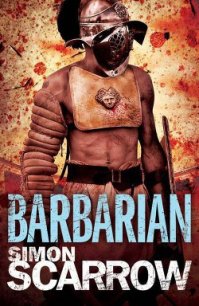Sword and Scimitar - Scarrow Simon (читать книги онлайн полные версии .TXT) 📗
Richard took a blanket for himself and sat on the edge of the bed that Thomas had chosen for himself, leaning forward slightly to get closer to the warmth of the fire. There was a brief silence before he spoke.
‘Those scars. Did you get them in the service of the Order?’
‘Some. Others came from my service elsewhere.’ Thomas eased himself back and round so that he could face the younger man. He touched his left shoulder. ‘An arrow cut through me there while I was in Flanders. ’Twas a flesh wound, but I bled like a stuck pig, as I recall.’ He moved his hand down to his left breast. ‘This is where a dagger cut me deeply. This other I got on an expedition in the harbour at Algiers. La Valette did not want us to be hampered by armour. There was a skirmish aboard the galleon we seized and a corsair leaped out of the shadows in front of me and struck. I’d have been cut down with his second blow if La Valette had not come between us and killed the fellow.’ Thomas looked down into the fire, his brow creasing at the memories. He tapped the inside of his left elbow. ‘The scar there was from a bum, when we attacked a corsair fort near Tripoli. The enemy were using incendiary pots. One burst on the wall beside the ladder I was climbing and the naphtha burned through the chain mail and the gambison beneath and on to my flesh.’ He winced at the memory of the terrible, intense pain that he had endured during the long night it took to capture the fort.
‘What about that one, on your forehead?’ Richard asked quietly.
‘This?’ Thomas raised his hand and traced the thin scar an inch below the hairline. He was silent for a moment as he slowly ran the finger backwards and forwards along the scar and Richard watched him expectantly, eyes glinting with reflection from the fire that was wanning the room. Thomas cleared his throat. ‘This one I got when I slipped on some ice and hit my head on the door of an inn.’
Richard’s jaw sagged and then he burst into laughter and Thomas joined in, filling the room with a hearty sound. The laughter continued for longer than it might have done now that the tension between the two men had eased for the first time since meeting. And then, as it died away, Richard became self-conscious and stood up and pulled two chairs over towards the fire and hung his clothes over them to dry, hesitating a moment before he did the same for Thomas’s cloak, jerkin and shirt. Meanwhile, Thomas took out the small knife he carried in a sheath at his back and cut the bread into hunks and sliced the cheese and offered half to Richard.
‘Thank you.’ The young man stood up and gestured to the bed. ‘Yours, I think.’
Thomas shook his head. ‘Have it.’ He thumped the sleeping mat beneath him. ‘This will serve well enough.’
Richard sat and they both began to eat. It was the first meal in weeks that Thomas had eaten that was not infused by the salty tang of the sea, nor spoiled by the nauseating roll of the galleon as it clawed its way across murky waves under a grey sky. Consequendy, simple bread and cheese as it was, the taste was unrivalled and as his stomach filled and his body was warmed Thomas felt content. Partly, he realised, because now there was a prospect of some companionship where before there had been only a frosty tolerance between himself and Richard. Thomas wanted to find out more about Cecil’s agent, partly out of a desire to learn what he could about the document and the precise nature of Richard’s orders but also out of simple curiosity and a wish to know the man better. Yet he knew that to presume too much too quickly might risk having Richard raise his guard once again. He reached for the jug of wine and poured them each a cup. He handed one across to Richard. The clothes had begun to steam and a musty aroma filled the room.
‘You were well chosen for this mission,’ said Thomas. ‘If you speak your other languages as well as you do Spanish then you will be very useful indeed.’
Richard gave a quirky smile. ‘Useful? Perhaps a man of my social station should consider that a compliment.’
Thomas was tempted to ask more but there was a touch of anger and, more, shame in the young man’s voice and he decided not to pursue the matter for the present.
‘You have played your part well enough,’ Thomas continued. ‘But we will both be called upon to perform like the best players in London if we are to convince the other members of the Order when we reach Malta. It is not enough that you behave like a squire. You must begin to think like one. You must do whatever I ask of you without hesitation and without any of the resentment you occasionally show. You will keep my armour, equipment and wardrobe clean. You will behave with due courtesy to everyone you encounter, no matter what their class. You must, at all times, deport yourself as a gentleman who aspires to become a knight. And not just any knight, but one of the Order. If you can do that then you will pass for a squire.’
Richard’s expression became bitter. ‘Then I shall pass for what I shall never become, nor ever a knight.’
‘How so?’
‘Nobility is the preserve of those with no stain on their past. It matters not what the worth of a man is if there is a blemish against his name which nothing can erase.’
‘But you are of gentle birth,’ Thomas replied. ‘That is self- evident. You are as much a gentleman as I am, I can see that.’
‘Save for the fact that I was born on the wrong side of the sheet, Sir Thomas. That is something that no one can change. I am a bastard, known as such by those who raised me. That is why I have chosen this course in life. Now, if you will excuse me, I am tired and would sleep well before we journey on the morrow.’ He drained his cup and lay down on the bed, turned on his side, so that his back was towards Thomas and the fire.
For a while Thomas gazed at him, wondering about his origins. What must it be like to bear the burden of such a stigma in a world in which such things counted so deeply, despite the manifold wickedness and immorality of many who laid claim to the mantle of nobility? No wonder the young man was bitter. Nature had clearly blessed him with a fine mind, fair body and sound constitution. Society had cursed him with a label which would blight him until the day he died. For a moment Thomas began to feel pity for his companion, and then he caught himself. There was no need to add to Richard’s difficulties with such an unworthy sentiment.
He sighed softly and then built up the fire. Turning the clothes drying on the backs of the chairs, he placed the boots beside them and then climbed into his own bed and lay on his back staring up at the ceiling. Sleep no longer came to him as easily as it once did and a church bell in the port sounded midnight before Thomas closed his eyes and drifted off.
CHAPTER TWELVE
The road across the north of Spain passed through the rocky terrain of Navarra and Aragon before reaching Catalonia. It rained frequently and the high passes over the hills were laden with snow and ice that slowed their pace. Most nights Thomas and Richard stopped in small villages, paying to sleep in barns when they could not find a room. Twice they had to sleep in the open, horses tethered to stunted trees while the two men huddled round a fire in the shelter of a rocky outcrop. They took it in turns to sleep, wary of the small bands of robbers who preyed on passing travellers. Once they were followed for half a day by a group of men on small unkempt ponies. Thomas and Richard stopped briefly to strap on their swords and made sure that the weapons were clearly visible. Shortly after, the men reined in and watched them ride out of sight.
The two Englishmen attracted attention in every village and town they passed through. The King and Church had been assiduous in their efforts to ensure that their people considered the island ruled by the Protestant Queen Elizabeth a godless realm of evil and depravity. As such the knight and his squire excited a degree of suspicion and fear and while they were never threatened or turned away, thanks to the travel warrant issued by the port master of Bilbao, there was no warmth or hospitality in the way they were received.




